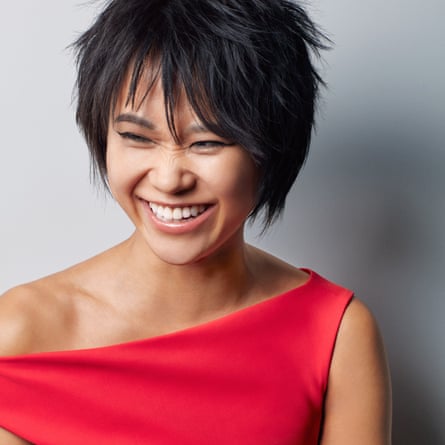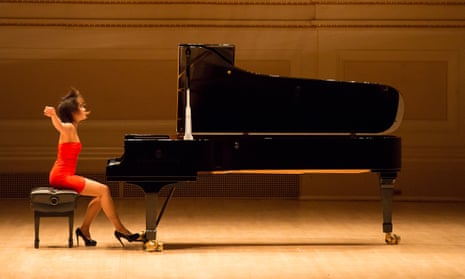There are two Yuja Wangs. Or so you might think. One is the young Chinese pianist whose virtuosity and musical intelligence place her in the top echelon of performers. The other is an elfin, spiky-haired fashionista courted by Armani and Rolex, who has a zany wit and delights in appearing before concert audiences in itsy bitsy dresses and five-inch heels. This split identity is not of her making. Young classical artists are loosening up, but Wang is on a different level of visual and aural adventure that still takes people aback.
“I want to relate all life to music,” she says, cross-legged on a sofa in a borrowed Paris apartment – home is New York – looking calm, serious and slightly sleepy. Dressed in tight, cropped yoga pants and skinny vest she looks no different to the people thronging the Left Bank outside in the sun.
“I’m interested in looking good, but fashion bores me as much as checking for updates on my phone,” she says with a yawn, downing an espresso. “Rather than following textbook behaviour and doing what classical musicians have always done…” She stops mid-sentence to shape her thoughts, then giggles explosively. “This is all philosophical bullshit! I need to sleep first. I feel like a zombie.”
Wang was in Florence the night before, out late “having a few drinks”. Her current European tour covers more than a dozen cities, including London, where she gives her Royal Festival Hall solo-recital debut in the International Piano Series on 11 April. The programme consists of two monumental works: Chopin’s 24 Preludes and Brahms’s Variations and Fugue on a Theme by Handel. Schubert is also on the schedule.
“Nah. I’ve scrapped Schubert. How can I know two years ahead what I’m going to play at 8pm in this hall in this city? I’m still exploring repertoire. I just say some random composer names…” Doesn’t that upset audiences? “Yes. No. They get more encores!” For Wang, encores are integral, not add-ons. “It’s when I feel free, I move more, I improvise.” The rest of the time she is upright, graceful, like a dancer or gymnast. She doesn’t admit to doing exercise – “Run? I’ve never run in my life” – but learned stretches from her dancer mother. “She taught me good posture. My father, a percussionist, sorted out timing and rhythm.”
Her head is still in Florence. “Yesterday, I was in a church dressed as I am now, having a little quiet spiritual moment to myself. Then this man taps me on the shoulder and says I’m being disrespectful to Jesus.” Did she cover herself up? “No way. I don’t know if he understood what I said to him. But I guess everyone knows the F-word.”
Born in Beijing, an only child – “Of course. I’m Chinese!” – Wang started the piano aged six and gave her first concert less than a year later. Was she immediately recognised as a prodigy? “Yeah, I guess so.” At 14 she left China, alone and not speaking any English, and went to study first in Canada then to the Curtis Institute of Music, in Philadelphia. She has lived in the US since.
“It was right for me. I am independent-minded, self-reliant.” With the guidance of various mentors, including the pianists Leon Fleisher and Gary Graffman, she immersed herself in the great European piano tradition. Her heroes are Kempff, Schnabel, Horowitz, Maurizio Pollini and Evgeny Kissin. When, in 2007, Martha Argerich cancelled a concerto date, Wang stepped in and got her big break.

Russian repertoire is core to her programming – music she often heard as a child, when her mother danced – especially Tchaikovsky, whose Piano Concert No 1 she will play in London in next month with Rome’s Orchestra of Santa Cecilia, conducted by Antonio Pappano. “I love Pappano. So intense. So impassioned and sexy. And such a brilliant pianist himself!” She has no reverential tone for discussing music, no angst about saying or doing the right thing.
“I’m Chinese,’ she says. “We don’t do guilt. We do zen.” She once told a Chinese TV presenter that she wanted to study Taoism. He expressed surprise that a young woman should be tackling this hard philosophy. He’d even heard she had read Goethe’s Faust. “It’s probably because I’m an Aquarius, open to everything,” she replied with a charming smile, offering a riposte as cleverly banal as the question deserved. She’s quite fierce.
Last year, Wang caused a stir by touring the titanic Hammerklavier sonata. “I thought, OK, you want Beethoven?” – whose music she hadn’t much played – “I’ll give you Beethoven!” Now she’s giving us Chopin’s Preludes: short, intense pieces played in a cycle lasting around 45 minutes. She has the Ballades, the Mazurkas and more in her repertoire or on disc, but this is a first. “The Preludes are like Chinese calligraphy: the hardest characters to paint are the ones that look simplest.”
Brahms is her latest passion. “In my 20s, I thought Brahms was square.” She turned 30 in February. “My favourite right now is the Intermezzi Op 117, No 3 in C sharp minor. Oh my God, I love it!” She could be talking shoes, which she also loves. “With Brahms, you need to feel grounded, as if the power comes up from your feet and the keyboard becomes an extension of your hands. Richter, I think, used to say he played from his thighs…” Richter covered his in baggy trousers; Wang’s are often bare and exposed. A profile in the New Yorker referred to her “extremely short and tight dresses that ride up as she plays, or clinging backless gowns that give an impression of near-nakedness ”.
The next day at her Paris concert, she changed after the interval from a gold gown into a tiny twist of shimmering green. Each was exquisite, and – at least from row Q – completely decent. Compared to a female tennis player she looked positively overdressed. What sticks most in the mind is the poetry and mastery in her performance of the Chopin Preludes.
“If a beautiful male pianist wears tight pants, I’m not going to think, ‘What’s in those pants’?” Really not, Yuja? Hoots of laughter. “OK, maybe. But if the music is beautiful and sensual, why not dress to fit? It’s about power and persuasion. Perhaps it’s a little sadomasochistic of me. But if I’m going to get naked with my music, I may as well be comfortable while I’m at it.”
- Yuja Wang plays at Royal Festival Hall, London, on 11 April as part of the International Piano Series, and on 11 May to perform with the Orchestra of Santa Cecilia and conductor Antonio Pappano.

Comments (…)
Sign in or create your Guardian account to join the discussion